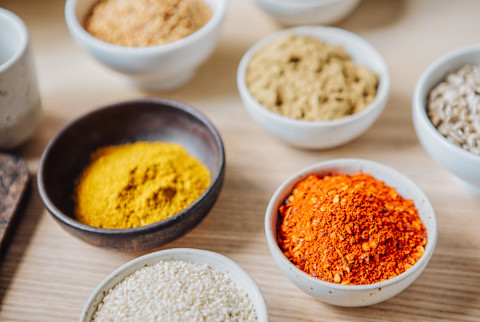Why Curry Consumption Might Be Linked To Better Metabolic Health In Women Over 50

Metabolic syndrome (MetS) refers to a group of factors linked to an increased risk of heart disease and other serious health concerns, according to the NIH's National Heart, Lung, and Blood Institute. While there are a number of existing markers of metabolic health to consider, researchers continue to investigate ways to minimize potential risks.
A recent study, published in Menopause: The Journal of the North American Menopause Society, considered the influence of certain lifestyle factors on MetS risk, specifically during menopause, in Korean women—and there's a popular dish that may actually help.
Metabolic syndrome, menopause, and...curry?
Initial results of the study suggest that postmenopausal women have a higher risk of MetS than premenopausal women. The study used data from 7,131 pre- and postmenopausal Korean women (all over 20 years of age) collected between 2009 and 2017. "The prevalence of MetS among Korean women is approximately 13.8% [premenopause]," they report, "and 54.6% postmenopause."
Based on their findings, the researchers were able to note a couple of factors that may reduce risk. First off, women who ate more curry, especially those who ate it often, had a lower risk of postmenopausal MetS. According to the paper, "Curried rice is a popular food in Korea and contains a high concentration of curcumin [...] the main active ingredient in Curcuma longa dried rhizomes (turmeric), is helpful for preventing and/or treating MetS because of its antioxidant and anti-inflammatory properties1."
Another factor that linked to risk reduction was a specific, sometimes overlooked nutrient: vitamin B2, also sometimes known as riboflavin. Specifically, researchers found "an increase in daily vitamin B2 intake by 1 mg reduced the risk of MetS by 45%." Like curcumin, it, too, has previously been linked to antioxidant action2 that may help protect against oxidative stress, which likely contributes to the risk of MetS-related conditions.
The takeaway.
Overall, countless factors affect metabolic health, but this study is a good reminder that seemingly small things like adding super spices to our diet may help more than we may realize. It's also important not to focus too much on our chronological age, when theories such as the idea of a metabolic age suggest our bodies may not align with the calendar as much as we thought.
The good news? We have a lot more control over the health of our bodies than we do over the pages of a calendar, and yes: There are things you can do to improve your metabolic age.
